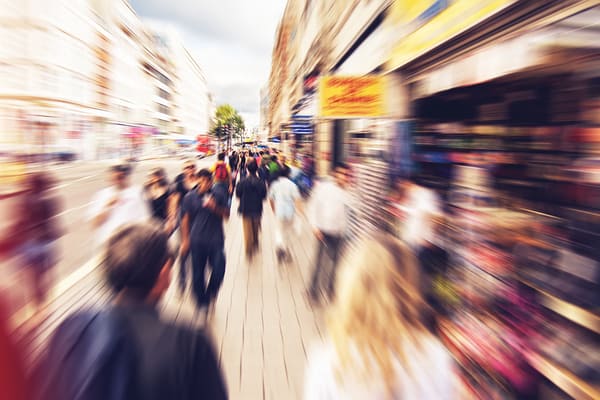Getting back to normal has been a mantra chanted by pretty much everyone everywhere for the past two years and, on the face of it, it looks like for retail that is starting to happen. Online retail sales across the board have fallen by 27% in February – a new record breaking January’s 24% – in the UK, while the grocery and FMCG sectors in particular have seen a drop of 20% year on year.
Much of this appears to have come through shoppers heading back to physical retail stores. Store visits are up 12% month on month, reversing many months of decline in physical retail and setting its growth at 0% – which is, compared to how things have been, pretty impressive.
But is everything now ‘back to normal’? Well yes and no – and maybe not for long. While shoppers are undoubtedly heading back to physical retail stores to shop, a third are still put off by the crowds and some 20% don’t think that physical stores carry the range of options that they have become used to online.
Further, of those that are looking to head back to the high street, 60% of UK shoppers want the option of a checkout-less experience via a hybrid model and a further 10% would favour a fully autonomous shopping experience
Many of these shoppers want a physical retail experience, but are also looking for speed and efficiency, as well as low-friction experiences around browsing and actually buying. In essence, they want to return to the high street, but as digital shoppers and they expect that experience when in store.
This presents retailers with a challenge. While it is great for many to be welcoming back so many shoppers, how sustainable is it this swing going to be? There is clearly a novelty factor at play: we have all been starved of physical retail and so are lapping it up, that probably will wane quite quickly.
Secondly, with so many shoppers now expecting a much more digital experience in store than they had pre-pandemic, the novelty could wear off even more rapidly when they find that they are back to queuing and being barged along by crowds. The lack of variety and the ‘endless aisle’ is also going to have an impact.
Thirdly, and perhaps most profoundly, the economy could yet cut off this nascent growth spurt at its source. Global fuel price rises, supply chain demands and the impact on the economy of the Ukrainian war are all set to continue to push up inflation in the UK and, in real terms, cut household spending right back.
In a new study from NielsenIQ that explores how consumer behaviour differs across the economic spectrum, 19% of UK shoppers are classed as ‘strugglers’, having experienced job or income loss due to COVID-19 which is still affecting them today – this is compared to 23% at a global level.
As fuel prices soar and, as a direct result food and other prices rise, this proportion could grow. And even for those that are now deemed strugglers, the impact is going to be very real indeed. We aren’t out of the woods yet.










